Jewish doc recognized as ‘Smartest Diabetes Expert’
 Patients of Dr. Michael Sokol should be pleased to learn that their doctor was recognized as the “Smartest Diabetes Expert in America” for the month of August.
Patients of Dr. Michael Sokol should be pleased to learn that their doctor was recognized as the “Smartest Diabetes Expert in America” for the month of August.
“I am honored to have received this recognition,” said Dr. Sokol. “I have spent my career in pursuit of the highest knowledge for my field, which benefits my patients.”
Who makes that decision you might ask? The award is presented by MDLinx, an innovative Internet-based service that allows physicians and other healthcare professionals to stay current with academic literature.
“It’s a Web-based program and we’re given a quiz every day. Anywhere between 200 and 300 doctors in the field of diabetes participate at any one time,” he explained.
This quiz ranks doctors on the accuracy of their answers as well as the speed of their answers.
“So during the month of August I apparently got the highest score,” he said. “Since I’ve been doing it I’ve regularly been ranked in the top 10.”
Dr. Sokol said several other Jewish doctors in the area also regularly take this quiz, which is about a year old. He praises friend and fellow endocrinologist Dr. Andrew Green, noting that he often does well on the quiz.
“I wouldn’t be surprised if he hasn’t won this as well,” said Dr. Sokol, who enjoys playing softball at the Jewish Community Center and bowling with B’nai B’rith when he has some time away from patients.
Dr. Sokol earned his medical degree from Northeastern Ohio University’s College of Medicine when he was only 23 years old. Born and raised in Akron, Ohio, he began his undergraduate studies when he was just 17 years old and completed both his undergrad and medical degrees in only six years because he attended class every summer.
“I enjoyed it, so I was lucky,” he said.
Dr. Sokol subsequently created and completed a combined internal Medicine and Psychiatry Residency at Brown University. During that tenure he assisted in teaching, patient-interviewing classes and co-authored several peer-reviewed articles and a textbook chapter.
Dr. Sokol did his endocrinology fellowship at Walter Reed Army Medical Center as a commissioned major in the U.S. Army Military Corps. He then served as assistant chief and then chief of endocrinology at Dwight D. Eisenhower Army Medical Center, associated with the Medical College of Georgia, during which time he was honored with the Army Commendation Medal. Dr. Sokol was also awarded the Masters Clinical Award in Psychopharmacology from the Neuroscience Education Institute.
Since 1993, Dr. Sokol has practiced internal medicine, endocrinology and psychiatry at Statland Medical Group at Menorah Medical Center.
Steven D. Wilkinson, Menorah’s president and chief executive officer, said Dr. Sokol is an asset to Menorah Medical Center’s mission of providing high-quality care to patients.
“His unwavering commitment to stay current on advances in treatment and technology in his field demonstrates a deep dedication to evidence-based clinical processes to achieve the best outcomes for his patients. This is what award-winning medicine is about,” the hospital’s CEO said.
Because Dr. Sokol became a physician when he was so young, he explained that he ended up with three specialties because he had “some extra time on his hands.”
“I created a residency that did not exist before at Brown University. I did a combined internal medicine and psychiatry residency and that residency still exists,” he said.
But when he was done, he decided he didn’t want to practice internal medicine or psychiatry full time. Since he had always been interested in what was originally called psychoneuroendocrinology, he decided to do an endocrinology fellowship as a commissioned major in the U.S. Army, which he did at Walter Reed Medical Center during Operation Desert Storm.
He chose the Army for two reasons. It had a very nice endocrinology program, “and I thought it would be an adventure.”
“It was great. I loved it. I’d recommend it for anyone,” said the doctor, who spent all his active duty stateside, two years in Washington, D.C., and two years in Augusta, Ga.
While he practices all three specialties, he said his focus is endocrinology. He enjoys the three specialties and said every day in the office is different, depending on whatever his patients’ needs are.
“I don’t like to be academically bored,” he noted.
He and his wife Shari chose to settle in Kansas City because Shari’s aunt and uncle, Ruth and the late Rabbi Morris Margolies, lived here.
“They had children here and we wanted to be somewhere where we had a core group of family,” he said.
Dr. Sokol currently serves as director of medical education at Menorah Medical Center and most recently as president of the Heartland Chapter of the American Association of Clinical Endocrinologists. As a result of peer voting, Dr. Sokol has been listed since 2007 in the field of endocrinology in KC Magazine’s annual “Super Doc” feature. He also is a member of Rep. Kevin Yoder’s Health Policy Subcommittee; a group that helps the Kansas congressman develop ideas on health-related matters.
In addition, once a year Dr. Sokol goes to Washington to talk to Missouri and Kansas congressmen and senators on behalf of the American Association of Clinical Endocrinologists to inform them of important medical issues affecting our patients.” One of the top items on its agenda right now is the Diabetes Initiative, which is currently on Congress’ agenda and will raise awareness and direct monies toward the care of patients with diabetes.
A member of Kehilath Israel Synagogue, the busy doc enjoys volunteering and has served on the board as a vice president for the past seven years.
“The more you volunteer the more rewards you find yourself receiving,” he said.
“I also come from a family of community volunteers. My aunt, my mother’s sister, was the former president of the Akron Jewish Community Center and my father’s father, my grandfather, was one of the leaders of the Akron Jewish community,” he continued.
In a nod to Jewish tradition, Dr. Sokol said his parents always told him they didn’t care what he did professionally as long as he was able to teach it. He abides by their wishes.
“It’s not uncommon for me to have residents and students spend a month with me,” he said.



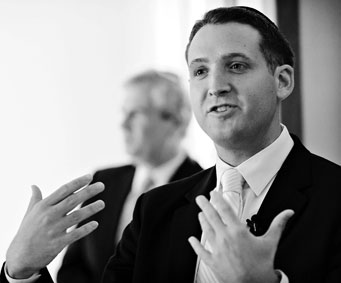 “Arab Spring or Islamist Winter?” is the title of this year’s Milton Firestone Lecture, to be held at noon Sunday, Jan. 13, at the Jewish Community Center. Zvika Krieger, senior vice president of the S. Daniel Abraham Center for Middle East Peace and Foreign Policy Correspondent for The Atlantic, coordinating Middle East coverage, will present an overview of the of the opportunities and challenges in the “new Middle East.”
“Arab Spring or Islamist Winter?” is the title of this year’s Milton Firestone Lecture, to be held at noon Sunday, Jan. 13, at the Jewish Community Center. Zvika Krieger, senior vice president of the S. Daniel Abraham Center for Middle East Peace and Foreign Policy Correspondent for The Atlantic, coordinating Middle East coverage, will present an overview of the of the opportunities and challenges in the “new Middle East.”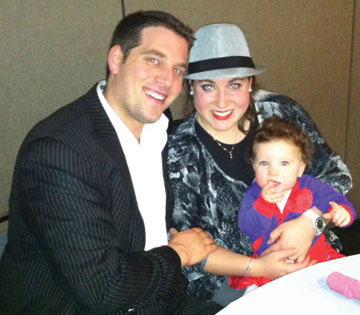 Congregation Beth Israel Abraham & Voliner is proud of its young members who have come from near and far and the contributions that they have made. That’s why it has chosen to honor this next generation of Kansas City’s Jewish leaders on Sunday, Jan. 27, at the annual Purim Gala. The event will be held at Oakwood Country Club, starting at 5 p.m. with cocktails, musical entertainment, with an elegant kosher dinner at 6 p.m. The speaker will be Dr. Rona Novick of Yeshiva University. Dr. Novick is a nationally recognized expert in the fields of psychology, parenting, education and family life. She is a much sought speaker because of her wit, warmth and engaging style.
Congregation Beth Israel Abraham & Voliner is proud of its young members who have come from near and far and the contributions that they have made. That’s why it has chosen to honor this next generation of Kansas City’s Jewish leaders on Sunday, Jan. 27, at the annual Purim Gala. The event will be held at Oakwood Country Club, starting at 5 p.m. with cocktails, musical entertainment, with an elegant kosher dinner at 6 p.m. The speaker will be Dr. Rona Novick of Yeshiva University. Dr. Novick is a nationally recognized expert in the fields of psychology, parenting, education and family life. She is a much sought speaker because of her wit, warmth and engaging style.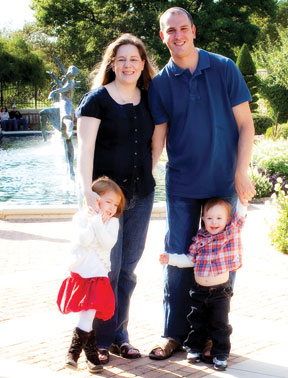 Adam and Alison Kaye are among the many young leaders at BIAV who moved to Kansas City. Adam is a trauma surgeon at Overland Park Regional Medical Center and Alison is a pediatric plastic surgeon at Children’s Mercy Hospital. The Kayes headed BIAV Pizza Night, are involved in many other BIAV activities, and also support the Kansas City Kollel. Originally from New York, they moved to Kansas City from Philadelphia in June 2009 and have two children, Abigail, 3, and Asa, 2.
Adam and Alison Kaye are among the many young leaders at BIAV who moved to Kansas City. Adam is a trauma surgeon at Overland Park Regional Medical Center and Alison is a pediatric plastic surgeon at Children’s Mercy Hospital. The Kayes headed BIAV Pizza Night, are involved in many other BIAV activities, and also support the Kansas City Kollel. Originally from New York, they moved to Kansas City from Philadelphia in June 2009 and have two children, Abigail, 3, and Asa, 2.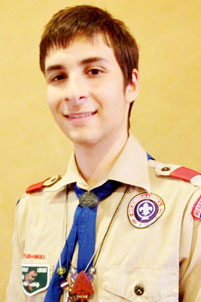 “On my honor, I will do my best to do my duty to God and my country, to obey the Scout law to help other people at all times, to keep myself physically strong, mentally awake and morally straight. A Scout is trustworthy, loyal, helpful, friendly, courteous, kind, obedient, cheerful, thrifty, brave, clean and reverent.”
“On my honor, I will do my best to do my duty to God and my country, to obey the Scout law to help other people at all times, to keep myself physically strong, mentally awake and morally straight. A Scout is trustworthy, loyal, helpful, friendly, courteous, kind, obedient, cheerful, thrifty, brave, clean and reverent.”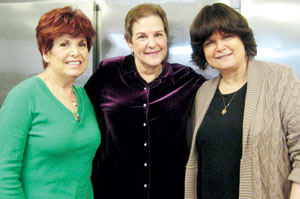 It’s no secret that hunger among members of the Jewish community is on the rise. The newest program in the area set to help tackle this problem, and the first to provide already prepared kosher food to an individual’s home, is Kosher Meals on Wheels. It is being organized under the auspices of the Torah Learning Center and should be up and running sometime in January.
It’s no secret that hunger among members of the Jewish community is on the rise. The newest program in the area set to help tackle this problem, and the first to provide already prepared kosher food to an individual’s home, is Kosher Meals on Wheels. It is being organized under the auspices of the Torah Learning Center and should be up and running sometime in January.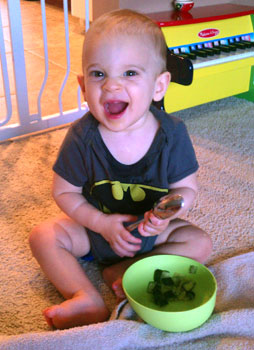 As we’ve done for more years than we can remember, The Chronicle will shower the first Jewish baby of 2013 with prizes. Information about our annual contest, and the 2013 prize package, appears on pages 18 and 19 of The Jewish Chronicle newspaper.
As we’ve done for more years than we can remember, The Chronicle will shower the first Jewish baby of 2013 with prizes. Information about our annual contest, and the 2013 prize package, appears on pages 18 and 19 of The Jewish Chronicle newspaper. From the 1930s to the present, American filmmakers’ varied depictions of Adolf Hitler, the Nazis and the genocide of European Jewry have always involved a coming together of art, commerce, politics and history. In turn, these representations have exerted a profound influence on popular culture as well as public perception of and opinion about these events.
From the 1930s to the present, American filmmakers’ varied depictions of Adolf Hitler, the Nazis and the genocide of European Jewry have always involved a coming together of art, commerce, politics and history. In turn, these representations have exerted a profound influence on popular culture as well as public perception of and opinion about these events.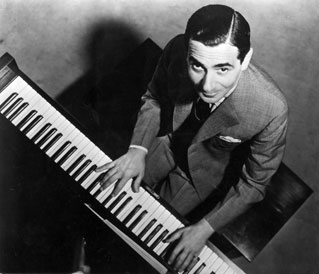 PBS will air “Curtain Upon Broadway Musicals: A Jewish Legacy,” from “THIRTEEN’s Great Performances” on Jan. 1. Locally it will be shown on KCPT three times, at 8:30 p.m. Tuesday, Jan. 1, at 1:30 a.m. Wednesday, Jan. 2, and 2 a.m. Monday, Jan. 7. It will also air on KCPT 2 at 10:30 p.m. Saturday, Jan. 12; check with your cable company for channel availability.
PBS will air “Curtain Upon Broadway Musicals: A Jewish Legacy,” from “THIRTEEN’s Great Performances” on Jan. 1. Locally it will be shown on KCPT three times, at 8:30 p.m. Tuesday, Jan. 1, at 1:30 a.m. Wednesday, Jan. 2, and 2 a.m. Monday, Jan. 7. It will also air on KCPT 2 at 10:30 p.m. Saturday, Jan. 12; check with your cable company for channel availability.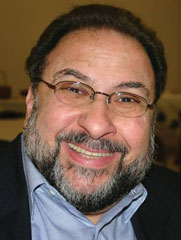 How do you transform a dreary January into a month of light and laughter? Find someone who’s very funny and put that person on stage. The Jewish Community Center is doing just that, presenting Moshe Waldoks, rabbi, standup comedian and co-editor of the “Big Book of Jewish Humor.” Waldoks will present “A Very Funny, Historically Comprehensive and Deeply Moving Overview of Jewish Humor” at 4 p.m. Sunday, Jan. 6, followed by a book signing and sale. The event, taking place in the White Theatre, is free and the community is invited. He will make a second presentation at noon on Monday, Jan. 7.
How do you transform a dreary January into a month of light and laughter? Find someone who’s very funny and put that person on stage. The Jewish Community Center is doing just that, presenting Moshe Waldoks, rabbi, standup comedian and co-editor of the “Big Book of Jewish Humor.” Waldoks will present “A Very Funny, Historically Comprehensive and Deeply Moving Overview of Jewish Humor” at 4 p.m. Sunday, Jan. 6, followed by a book signing and sale. The event, taking place in the White Theatre, is free and the community is invited. He will make a second presentation at noon on Monday, Jan. 7. The Jewish Community Center presents the Neil Simon comedy “Laughter on the 23rd Floor,” beginning Saturday, Jan. 5, in the White Theatre. Performances are Jan. 5, 10 and 12 at 7:30 p.m. and Jan. 6 and 13 at 2 p.m.
The Jewish Community Center presents the Neil Simon comedy “Laughter on the 23rd Floor,” beginning Saturday, Jan. 5, in the White Theatre. Performances are Jan. 5, 10 and 12 at 7:30 p.m. and Jan. 6 and 13 at 2 p.m.